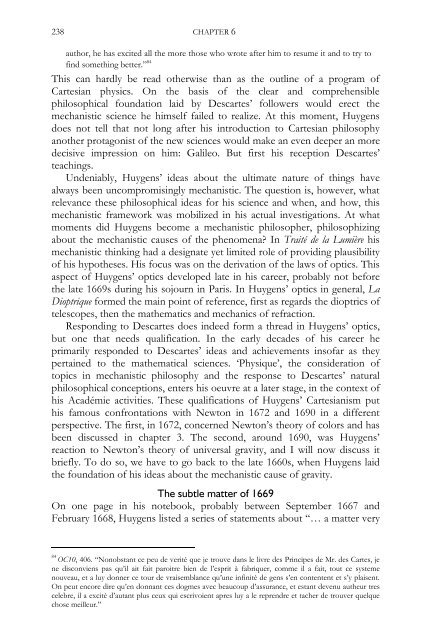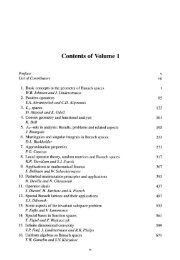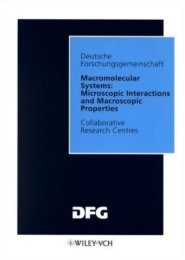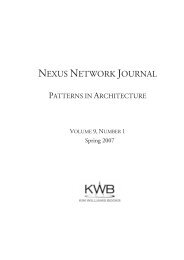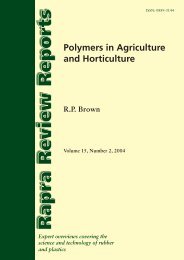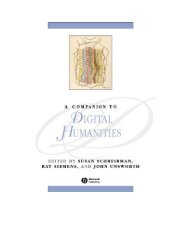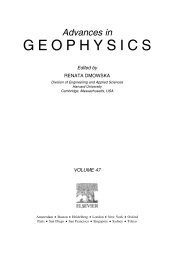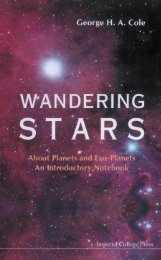Lenses and Waves
Lenses and Waves
Lenses and Waves
You also want an ePaper? Increase the reach of your titles
YUMPU automatically turns print PDFs into web optimized ePapers that Google loves.
238 CHAPTER 6<br />
author, he has excited all the more those who wrote after him to resume it <strong>and</strong> to try to<br />
find something better.” 84<br />
This can hardly be read otherwise than as the outline of a program of<br />
Cartesian physics. On the basis of the clear <strong>and</strong> comprehensible<br />
philosophical foundation laid by Descartes’ followers would erect the<br />
mechanistic science he himself failed to realize. At this moment, Huygens<br />
does not tell that not long after his introduction to Cartesian philosophy<br />
another protagonist of the new sciences would make an even deeper an more<br />
decisive impression on him: Galileo. But first his reception Descartes’<br />
teachings.<br />
Undeniably, Huygens’ ideas about the ultimate nature of things have<br />
always been uncompromisingly mechanistic. The question is, however, what<br />
relevance these philosophical ideas for his science <strong>and</strong> when, <strong>and</strong> how, this<br />
mechanistic framework was mobilized in his actual investigations. At what<br />
moments did Huygens become a mechanistic philosopher, philosophizing<br />
about the mechanistic causes of the phenomena? In Traité de la Lumière his<br />
mechanistic thinking had a designate yet limited role of providing plausibility<br />
of his hypotheses. His focus was on the derivation of the laws of optics. This<br />
aspect of Huygens’ optics developed late in his career, probably not before<br />
the late 1669s during his sojourn in Paris. In Huygens’ optics in general, La<br />
Dioptrique formed the main point of reference, first as regards the dioptrics of<br />
telescopes, then the mathematics <strong>and</strong> mechanics of refraction.<br />
Responding to Descartes does indeed form a thread in Huygens’ optics,<br />
but one that needs qualification. In the early decades of his career he<br />
primarily responded to Descartes’ ideas <strong>and</strong> achievements insofar as they<br />
pertained to the mathematical sciences. ‘Physique’, the consideration of<br />
topics in mechanistic philosophy <strong>and</strong> the response to Descartes’ natural<br />
philosophical conceptions, enters his oeuvre at a later stage, in the context of<br />
his Académie activities. These qualifications of Huygens’ Cartesianism put<br />
his famous confrontations with Newton in 1672 <strong>and</strong> 1690 in a different<br />
perspective. The first, in 1672, concerned Newton’s theory of colors <strong>and</strong> has<br />
been discussed in chapter 3. The second, around 1690, was Huygens’<br />
reaction to Newton’s theory of universal gravity, <strong>and</strong> I will now discuss it<br />
briefly. To do so, we have to go back to the late 1660s, when Huygens laid<br />
the foundation of his ideas about the mechanistic cause of gravity.<br />
The subtle matter of 1669<br />
On one page in his notebook, probably between September 1667 <strong>and</strong><br />
February 1668, Huygens listed a series of statements about “… a matter very<br />
84 OC10, 406. “Nonobstant ce peu de veritè que je trouve dans le livre des Principes de Mr. des Cartes, je<br />
ne disconviens pas qu’il ait fait paroitre bien de l’esprit à fabriquer, comme il a fait, tout ce systeme<br />
nouveau, et a luy donner ce tour de vraisemblance qu’une infinitè de gens s’en contentent et s’y plaisent.<br />
On peut encore dire qu’en donnant ces dogmes avec beaucoup d’assurance, et estant devenu autheur tres<br />
celebre, il a excitè d’autant plus ceux qui escrivoient apres luy a le reprendre et tacher de trouver quelque<br />
chose meilleur.”


